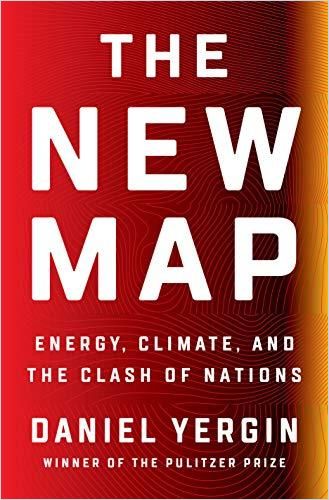Pulitzer Prize–winner Daniel Yergin details today’s map of geopolitical power through the prism of energy and economics.

New Geopolitics
Pulitzer Prize–winning author, speaker, energy expert and economic historian Daniel Yergin details how economic and military dynamics between countries and energy supply and distribution shape geopolitics. Yergin explains how changing patterns of energy extraction and distribution powerfully affect the United States, China, Russia and the Middle East. The US revolution in shale oil and gas, the author finds, transformed the world’s energy markets and made the United States the premier source of oil and gas, and a major exporter.
This Wall Street Journal bestseller and USA Today Best Book of 2020 garnered Yergin the American Energy Society’s Energy Writer of the Year award. NPR called this, “A master class on how the world works.” The Wall Street Journal regarded it as, “Reportorial and supremely readable – no mean feat among geostrategy tomes.” And The Economist found Yergin’s insights, “Brisk and authoritative, an impressive combination.”
Flow of Energy
Yergin sets the stage by reminding readers that geopolitics involves the power dynamic between nations. Energy shapes this dynamic globally, he reveals, through shifting supply, demand and movement.
Energy reflects far-reaching alterations in global supply and flows, driven in major part by the remarkable change in the energy position of the United States, and by the growing global role of renewables and the new politics of climate.Daniel Yergin
Yergin credits the United States’ renewed energy strength to advances regarding extracting oil and gas from shale. But he’s quick to point out that a nation’s energy power could, in the future, depend on its willingness and ability to move toward “net zero carbon” emissions.
Extracting oil from shale, Yergin reveals, changed the United States’ and Texas’s position in energy markets. Yergin offers the startling truth that by 2014, Texas was producing more oil than any nation other than Saudi Arabia and Iraq.
Soviet Union
In 1991, Yergin recounts, the Soviet Union disintegrated into independent nations, which left the new Russian Federation with a diminished population and economy. Yergin ties Putin’s drive for remaking Russia into a world power to the country’s oil and gas reserves.
The earnings from oil and gas exports provide the financial foundation for the Russian state and Russian power…Much more than anything else, these resources make Russia a major player in the world economy.Daniel Yergin
As proof of Russia’s resurgence, Yergin cites that as of 2018, Russia matched the Soviet Union’s peak oil production – 11.4 million barrels a day. Between 2000 and 2012, Yergin concludes, Russia shifted from economic vulnerability to economic stability and strength.
Russia, the United States and China
Curiously, Yergin pinpoints Russia granting Edward Snowden asylum in 2013 as a tipping point in the deterioration of US/Russian relationships. Not many analysts rate that moment as so pivotal; this emphasis speaks to Yergin’s original perspective.
Again naming a pivotal moment, Yergin tells how, in 2014, Putin made an official state visit to China’s President Xi Jinping that illustrated Russia’s linking of power and energy. Putin struck a $400 billion deal with China for Russian gas, and Yergin names the quid pro quo: China agreed to finance a $45 billion, 1,300-mile pipeline in Siberia. Yergin characterizes this as a perfectly straightforward relationship in contrast to convoluted US/Russia dealings.
Iran
Saudi Arabia and Iran have constantly been at odds, Yergin tells, and while religion and politics are factors, oil and its distribution remain central. Iran believed, the author explains, that Western oil sanctions would have little effect, but underestimated US shale oil production. That’s why, Yergin posits, Iran held discussions with the US concerning nuclear capabilities.
Reduced Demand
Tracking the Byzantine processes that determine oil prices, Yergin remarks on the counterintuitive situation that occurred when, with US shale oil production on the rise, oil prices remained high due to production deficits caused by turmoil in Libya and Nigeria.
In the fall of 2014, Yergin relates, oil prices crashed to $84 per barrel as Canada, Russia, Brazil and Iraq increased production. The changing patterns in world markets, Yergin proposes, spring from shale oil being less expensive to produce than most people thought. He reports a major shift in oil industry mind-set from “long cycle” to “short cycle.” Short cycle was shale oil, Yergin clarifies: The interval between drilling and oil production is short. On the other hand, Yergin says, offshore oil, which can take years to generate returns, exemplifies long cycle.
Climate Change
After detailing how oil shapes geopolitics, Yergin avows that moving toward a “lower-carbon world” will be among the most important aspirations facing humanity. The author connects current events to a historical context by pointing out that Britain moved from burning wood to burning coal in part because deforestation made wood scarce. It wasn’t until 1900, he says, that coal more or less fueled the world and oil didn’t supplant coal until the 1960s – Yergin’s point is that energy transitions are neither a new phenomenon nor unmanageable.
The author offers that the Paris Climate Conference meant that fighting climate change moved beyond geopolitics and finance to become a social movement.
But the world, Yergin laments, has been moving away from collaboration and toward division.
The world has become more fractured, with a resurgence of nationalism and populism and distrust, great power competition, and with a rising politics of suspicion and resentment.Daniel Yergin
This, he warns, will exacerbate existing economic problems.
Complex and Startling
If you’ve not considered international oil geopolitics germane, Daniel Yergin will change your mind. He convincingly regards it as primal to every government’s functioning and to every significant power dispute worldwide. Yergin proves a captivating writer with a vast storehouse of knowledge. He draws connections across a dense spider’s web of oil consumption and production that lies beneath so many current and recent global conflicts. This is a gripping, eye-opening and wholly original work, worth reading with care. Leaders, students, professors, investors, historians and anyone curious about the underlying causes of today’s political events will benefit greatly from Yergin’s knowledge and insights.
Daniel Yergin’s other books – as author and co-author – include the Pulitzer Prize–winning The Prize: The Epic Quest for Oil, Money, and Power and The Quest: Energy, Security, and the Remaking of the Modern World.








